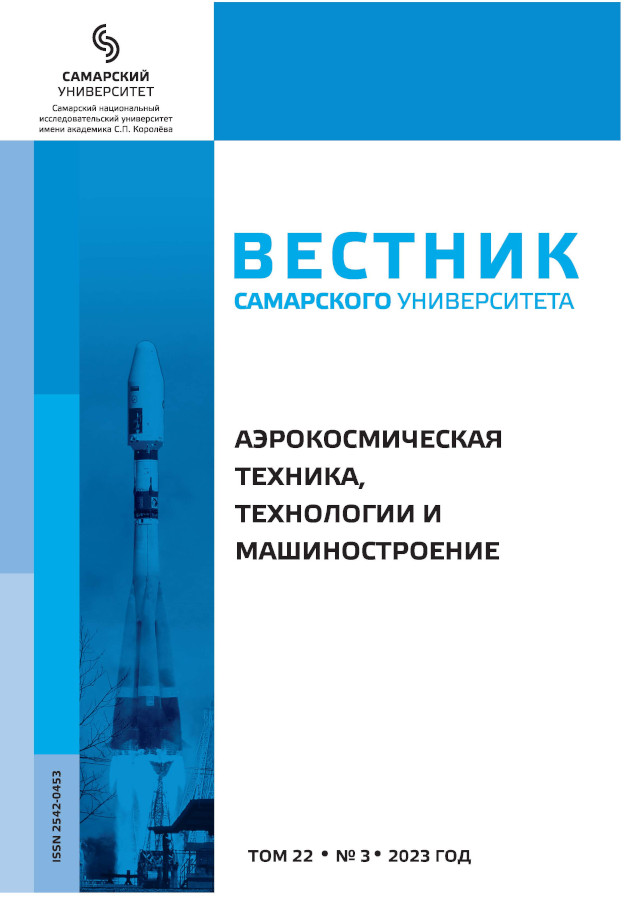Exploratory analysis of hybrid polymer metal-composite structures
- Authors: Khaliulin V.I.1, Petrov P.A.1, Kostin V.A.1, Levshonkov N.V.1
-
Affiliations:
- Kazan National Research Technical University named after A.N. Tupolev
- Issue: Vol 22, No 3 (2023)
- Pages: 160-175
- Section: MECHANICAL ENGINEERING
- URL: https://journals.ssau.ru/vestnik/article/view/26897
- DOI: https://doi.org/10.18287/2541-7533-2023-22-3-160-175
- ID: 26897
Cite item
Full Text
Abstract
The results of research in the field of development of technology for the manufacture of hybrid composites according to the scheme of directional fiber netting are presented. Reinforcement is carried out by combining carbon fibers and metal wire, impregnation with a polymer binder by infusion. The results of experimental evaluation of the tensile strength of composites reinforced only with wire, as well as hybrid samples with different percentages of carbon and metal fibers are presented. A significant dependence of the strength of the hybrid composite on the volume ratios of reinforcing materials and technological factors has been established. Design and technology recommendations aimed at improving the functional parameters of the hybrid composite are formulated.
About the authors
V. I. Khaliulin
Kazan National Research Technical University named after A.N. Tupolev
Author for correspondence.
Email: pla.kai@mail.ru
ORCID iD: 0000-0003-4340-0787
Doctor of Science (Engineering), Head of the Department of Aircraft Production
Russian FederationP. A. Petrov
Kazan National Research Technical University named after A.N. Tupolev
Email: 13petrof@mail.ru
Engineer of the Center of Composite Technologies
Russian FederationV. A. Kostin
Kazan National Research Technical University named after A.N. Tupolev
Email: VAKostin@kai.ru
Doctor of Science (Engineering), Head of the Department of Structural Strength
Russian FederationN. V. Levshonkov
Kazan National Research Technical University named after A.N. Tupolev
Email: n-levshonkov@mail.ru
Candidate of Science (Engineering), Associate Professor of the Department of Aircraft Construction and Design
Russian FederationReferences
- Komarov V.A. Theoretical basis for design of load-bearing structures produced using additive technologies. Ontology of Designing. 2017. V. 7, no. 2 (24). P. 191-206. (In Russ.). doi: 10.18287/2223-9537-2017-7-2-191-206
- Komarov V.A. Design and material. Ontology of Designing. 2023. V. 13, no. 2 (48). P. 175-191. (In Russ). doi: 10.18287/2223-9537-2023-13-2-175-191
- Shabalin L.P., Savinov D.V., Puzyretskii E.A., Mareskin I.V. A technique for stress-strain state analysis, optimization and experimental study of a hybrid composite-metal propeller blade. Russian Aeronautics. 2022. V. 65, Iss. 2. P. 260-267. doi: 10.3103/S1068799822020052
- Antipov V.V., Senatorova O.G., Sidelnikov V.V. Investigation of fire resistance of hybrid aluminiumglassplastic SIAL laminates. Trudy VIAM. 2013. No. 3. (In Russ.)
- Postnova M.V., Postnov V.I. Role of MPСM structures and their effect on vibration fatigue characteristics of gte constructive components. Trudy VIAM. 2017. No. 1 (49). (In Russ.). doi: 10.18577/2307-6046-2017-0-1-7-7
- Khaliulin V.I., Batrakov V.V., Petrov P.A Problem description and a study of reinforcement components to produce composite hybrid structures. Russian Aeronautics. 2022 V. 65, Iss. 4. P. 843-854. doi: 10.3103/S1068799822040250
- Benedict A.V. An experimental investigation of GLARE and restructured fiber metal laminates. Master's thesis. Daytona Beach, 2012. 103 p.
- Unal P.G. 3D woven fabrics. Woven Fabrics. 2012. P. 91-120. doi: 10.5772/37492
- Carvelli V., Ventura G., Poggi C. 3D reinforcement of composite materials. Master's thesis. Milan, 2011. 79 p.
- Nelyub V.A., Grashchenkov D.V., Kogan D.I., Sokolov I.A. Use experience of direct formation methods in case of production of big glass-reinforced plastic parts. Khimicheskaya Tekhnologiya. 2012. V. 13, no. 12. P. 735-739. (In Russ.)
- Chursova L.V., Dushin M.I., Khrul'kov A.V., Mukhametov R.R. Osobennosti tekhnologii izgotovleniya detaley iz kompozitsionnykh materialov metodom propitki pod davleniem. Sb. tezisov dokladov mezhotraslevoy nauchno-tekhnicheskoy konferentsii «Kompozitsionnye Materialy v Aviakosmicheskom Materialovedenii» (February, 17, 2009, Moscow). Moscow: VIAM Publ., 2009. P. 17. (In Russ.)
- Gliesche K. Application of the tailored fibre placement (TFP) process for a local reinforcement on an «open-hole» tension plate from carbon/epoxy laminates. Composites Science and Technology. 2003. V. 63, Iss. 1. P. 81-88. doi: 10.1016/s0266-3538(02)00178-1
- Kartashova E.D., Muyzemnek A.Yu. Technological defects of polymeric layered composite materials. University Proceedings. Volga Region. Technical Sciences. 2017. No. 2 (42). P. 79-89. (In Russ.). doi: 10.21685/2072-3059-2017-2-7
- Coppola A.M., Huelskamp S.R., Tanner C., Rapking D., Ricchi R.D. Application of tailored fiber placement to fabricate automotive composite components with complex geometries. Composite Structures. 2023. V. 313. doi: 10.1016/j.compstruct.2023.116855
- Spickenheuer A., Leippranda A., Bittricha L., Uhliga K., Richtera E., Heinricha G. Process-dependent material properties for structural simulation of composites made by tailored fibre placement. Proceedings of the ECCM16-16th European conference on composite materials (June, 22-26, 2014, Seville, Spain).
- Makhkamov N.Y., Yusupov G.U. Properties of metal-based and nonmetal-based composite materials. Theoretical & Applied Science. 2020. V. 86, Iss. 6. P. 629-634. doi: 10.15863/tas.2020.06.86.115
- Bigg D.M. Mechanical, thermal, and electrical properties of metal fiber‐filled polymer composites. Polymer Engineering & Science. 1979. V. 19, Iss. 16. P. 1188-1192. doi: 10.1002/pen.760191610
- Carbas R.J.C., Palmares M.P., da Silva L.F.M. Experimental and FE study of hybrid laminates aluminium carbon-fibre joints with different lay-up configurations. Manufacturing Review. 2020. V. 7. doi: 10.1051/mfreview/2019027
Supplementary files






















